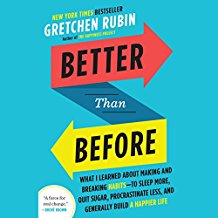 Better Than Before: Mastering the Habits of Our Everyday Lives by Gretchen Rubin, Crown Publishers, 2015.
Better Than Before: Mastering the Habits of Our Everyday Lives by Gretchen Rubin, Crown Publishers, 2015.
This book has generated so much buzz that I almost felt anything I could possibly say would be superfluous, but this has truly been the book of the week for me, so here goes.
The most original insight of the book is that not everyone is the same in their abilities to form and stick to habits. As I’ve mentioned in several recent posts, I am what Gretchen calls an “obliger,” a huge category that is made up of people who have a hard time motivating themselves but are driven by others’ expectations. It’s probably also fair to say that obligers are eager to impress others, to collect what Gretchen calls “gold stars.” As I recognize more and more the truth about my basic nature I am driven more and more to work with it instead of against it. There is no way I can change myself into an “upholder,” someone who responds as readily to inner as to outer expectations, or a “questioner,” who will do the work as long as good reasons are given for it. Being an “upholder/questioner” seems ideal to me, but that’s not what I am.
I mentioned last week that I was going to talk about “treats for obligers,” and the ideas on treats in this book are so helpful, and so true. Gretchen points out that what we usually think of as a “treat” or a “reward” (she makes a distinction between the two, but that needn’t concern us here) is counterproductive. If we lose ten pounds we can have dessert. If we meet an exercise goal we can take a day off. Etc. So the treats that we give ourselves tend to undo the good we’ve done with the behavior we’ve worked so hard to achieve. How weird is that?
There are two ideas that we need to keep in mind as we work on developing good habits and avoiding bad ones. First and foremost is that the reward for the good behavior is the good behavior itself. The reward for my getting up at my target time of 5:00 AM is the lovely time I get at the beginning of the day when I do that. That’s why I want to get up then. It would make no sense for me to say, “If I get up at 5:00 every weekday morning I can sleep in on Saturday.” What good will that do? I’m breaking the chain of wonderful mornings if I do that.
The second treat idea, and this is truly brilliant, is that the treat you give yourself should reinforce the good habit. So give yourself a nice pair of walking shoes if you want to stick to your habit of a daily walk. Get a manicure if you’re trying to break the habit of biting your nails. I have a friend who has fought to lose weight for many years; her treat was to get a pedicure every time she lost five pounds. I wouldn’t argue with that arrangement, since the pedicure wasn’t going to make her regain the weight, but now I wonder if she wouldn’t be better off buying herself something new to wear every time she reaches a goal. That would seem to me to be a more self-reinforcing treat.
The line between treats and tools can be a bit blurry. I described in last week’s post how the software writing tool Scrivener is helping me do more writing; it’s fun for me to fill out the little virtual notecards, so that’s somewhat in the area of a treat. Right now I’m on the hunt for another tool/treat: some kind of alarm clock that won’t wake Jim up at 5:00. I thought I had figured out a solution: setting the alarm on my phone and sleeping with earbuds in. I was able to do the sleeping part just fine, but the alarm just sounded from the phone and woke Jim up. There doesn’t seem to be a setting for the alarm to go through the headset. (I don’t have a smartphone and have no plans to get one.) So I’ve wasted quite a bit of time looking online for an “earbud alarm clock” or an “in-ear alarm clock” or various other permutations, and there doesn’t seem to be any such thing. Any ideas out there? It just seems so strange that no one has come up with this product.
Okay. You should read this book. There’s no way I can do all of its ideas justice, so I won’t even try, but I can guarantee that you’ll gain valuable insights about yourself from it. I’ll close with a funny story about how the book helped me in one particular instance. I had made some chocolate lava cakes for a special occasion, and I had quite a bit of leftover stabilized whipped cream. I indeed succumbed to the urge to eat some of with a spoon after the party, and Tuesday at chorale practice all I could think was, “I want to eat the rest of that whipped cream when I get home!” There was no way I could justify doing that, not even with some type of loophole. I just wanted it. But the little nudge of “What would Gretchen think?” helped me re-focus. As I drove home I decided that there was no reason to keep that temptation around. Gideon doesn’t like whipped cream, and Jim’s just so-so. They weren’t going to miss it. I’ll just run hot water on it and pour it down the sink, I decided. And I did indeed do just that. Very satisfying! And no, doing that wasn’t wasteful. The wasteful part was in my making too much of the stuff to begin with.